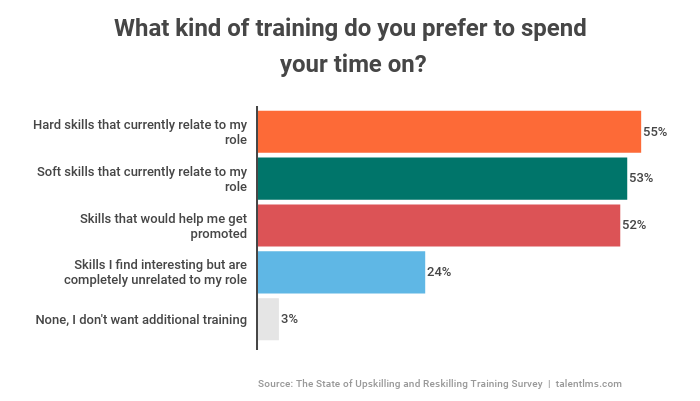As the economy evolves and technology continues to advance, learning new skills will be critical for success. Middle- to low-skill jobs will continue to get replaced.
Additionally, these changes and advancing technologies create complex jobs that are more intellectually demanding than the previous ones. The result is an environment where people who fail to learn new skills can get permanently replaced.
What’s more?
In a quest to save on costs, companies want to
hire perfect employees who can do the work of several employees. This makes it important for you to hone current skills and become an expert at your craft.
And guess what?
A majority of employees consider developing new skills to be a means of career advancement.

Image via TalentLMS
But are these the only reasons why you should strive to learn new skills?
No.
In this post, I’ll discuss a few reasons why learning new skills is crucial for career growth.
Why does career growth require continuously learning new skills?
Besides the changing conditions and new technologies, the coronavirus pandemic has also made it imperative for employees to develop new skills.
Employers also had to reinvent work processes, disrupt some job profiles, and revise the way employees completed tasks.
For example, the shift towards eCommerce rather than physical stores hugely changed the employment landscape. In this case, businesses want to hire people who can
boost eStore conversions and online competitiveness.
What’s more?
Companies have realized that training and upskilling employees are important. Increasing employee training budgets can make their companies stronger and better prepared for future disruptions.
But how does learning new skills contribute to career growth?
1. Increases professional opportunities and marketability
It’s unrealistic to assume that what you learned years ago will hold you up as the world evolves. In fact, if you want to remain competitive, you need to continuously learn, develop new skills, and progress in your career. And how can you keep up with this evolution?
Learn how to use new technologies and tools required at your workplace. Add qualifications and soft skills that can open up career growth opportunities for you.
If your employer has a
training and development program in place, take advantage of this opportunity. And if not, sign up for courses, webinars, and communities that can help you learn new things and develop new skills on your own.
For example, if you’re a clerical assistant at a marketing agency, tapping into resources that help you learn design could help you land the promotion you’re after.
What’s the best part about improving your skillset?
It will give you the strength and proof to ask for a good salary raise at the time of appraisals. In fact, you can also apply to large corporations and senior positions.
Most importantly, it puts you first in the line for a promotion and allows a smooth transition if you decide to switch careers.
2. Boosts adaptability
In the 1800s, you could learn a new skill and expect it to aid your career growth for the next 30 years.
Things have changed now, though. Business competencies tend to become obsolete in a few years. This leads to the questions:
- Are you ready to face and capitalize on the changing consumer behaviors, marketplace, and technologies?
- Do you possess the skills needed in the employees of a company that wants to adapt its offerings and practices to cater to those changes?
That’s why you need to learn skills that can enable you to meet
emerging business needs at all times.
But which new skills will make you competent?
While it’s important to develop your technical skills, soft skills are equally crucial. Many of them — including critical thinking, creativity, and collaboration — will help you foster competency. These soft skills will enable you to grasp and share knowledge,
communicate effectively, and meet the changing market needs.
And guess what?
Employers who want their companies to grow also invest in building a strong learning culture.
But why?
Because empowering employees can lead to improved performance, a high customer retention rate, and a team equipped to meet the needs of an ever-changing world.
But how can companies adopt a learning culture?
Companies can create bite-sized courses and upload them to
online tools and learning management systems. Doing this will make it easy for their employees to access training courses relevant to them on their own terms and time.
3. Increases resourcefulness
Apart from aiding your career growth, new skills can ensure that you remain relevant in your company even when new graduates join your department.
Failing to stay up to date with skills that can help you adapt to your profession’s technological changes can lead to job loss if your employer decides to replace you.
Most importantly?
Learning new skills can make you the go-to resource when problems occur at your company. You can become someone who can anticipate and resolve issues as they happen.
But you cannot become resourceful or gain career growth if you take a passive approach to learning.
Instead, you should have a mindset that drives you to always find solutions to problems. Practice to think out-of-the-box, generate new ideas, and visualize numerous possible ways to achieve success.
But how can you develop the skills required to become resourceful?
Leverage the numerous resources that can help you gain new skills and knowledge proactively. These include online course platforms, competitions, workshops, seminars, books, networks, mentors, online tutorials, podcasts, webinars, etc.
Achieve career growth by acquiring new skills
Navigating the evolving economic landscape and changing technological trends requires continuous learning. You need to develop new skills to achieve career growth.
This way, you can easily adapt to new technologies, find solutions to problems, and
create a personal brand.








